Climate change and health toolkit
Climate-resilient WASH toolkit
This toolkit provides resources to support the effective integration of climate change, water and health considerations into health and WASH policies and programmes to build climate-resilient WASH. Many of these tools were developed as part of two DFID-funded projects, “Building adaptation to climate change in health in least developed countries through resilient WASH” and “Delivering climate-resilient water and sanitation in Africa and Asia”, implemented between 2013-2021 in Bangladesh, Ethiopia, Malawi, Mozambique, Nepal and Tanzania.
Resources for building climate-resilient WASH available below include national policies, strategies and plans; vulnerability and adaptation assessment examples and tools; training packages; and information, education, and communication materials.
Key Resources
All →Climate-resilient water safety plans: managing health risks associated with climate...
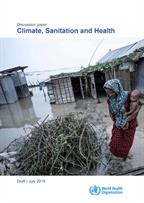
Discussion paper: Climate, sanitation and health
All Resources
All →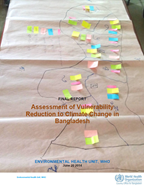
Assessment of Health Vulnerability Reduction to Climate Change in Bangladesh: Final Report
This report describes the application of a qualitative methodology to assess the reduction of perceived vulnerability to climate change in two coastal...
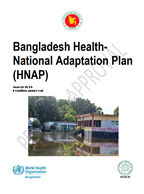
Bangladesh Health National Adaptation Plan (HNAP)
This document details the national climate adaptation strategies to mitigate the projected adverse effects of climate change and variability in the health...
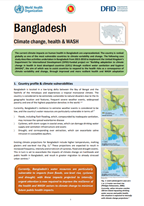
Bangladesh: Climate change, Health and WASH
The current climate impacts on human health in Bangladesh are unprecedented. The country is ranked globally as one of the most vulnerable countries to...
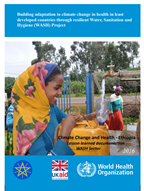
These mid-term status reports highlight the progress made in the health and WASH sectors on implementation of the DFID-funded project on “Building...
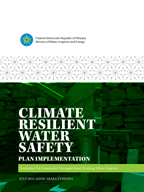
Climate Resilient Water Safety Plan Implementation: Guidelines for Community Managed Rural Drinking Water...
The partner publication to the urban guidelines, this rural guidance supports the sustainable implementation of climate resilient WSPs in community-managed...
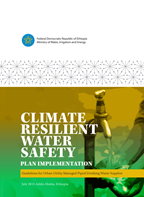
Climate Resilient Water Safety Plan Implementation: Guidelines for Urban Utility Managed Piped Drinking...
These guidelines provide stepwise information for urban water suppliers to develop, implement, monitor and review water safety plans. Special consideration...
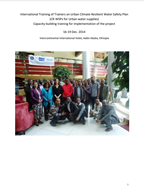
To support national roll-out of climate resilient water safety planning, a number of national and regional training events were held to build capacity...
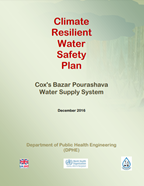
Climate Resilient Water Safety Plans
These plans outline the system specific assessment, management, monitoring and communication considerations to ensure the continued supply of safe drinking-water...
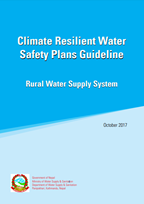
These “basic” guidelines are intended as the first step to support rural water suppliers to develop and implement an effective climate resilient...
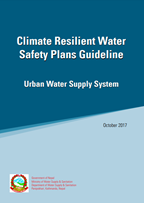
These guidelines have been developed to support urban water supply schemes to development and implement climate resilient WSPs. Intended for water suppliers...
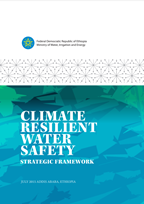
Climate Resilient Water Safety Strategic Framework
This framework provides the strategic blueprint to develop a climate orientated risk assessment and management approach for drinking-water supplies, from...

Climate Resilient WSP Document with Hazards Analysis Report
These technical reports describe the development of climate resilient WSPs in vulnerable water supply systems in Bangladesh (namely, the Rural 1 and 2...
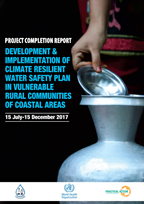
Development and Implementation of Climate Resilient Water Safety Plan in Vulnerable Rural Communities
This report highlights the key achievements of the climate resilient WSP development and implementation project in Bangladesh (namely, the Rural 1 and...

Development and Implementation of Climate Resilient Water Safety Plan in Vulnerable Rural Communities:...
This study was conducted in several rural areas in the flood, saline and drought prone areas of Bangladesh (namely, the Rural 1 and 2 groups) to determine...

Development and Implementation of Climate-Resilient Water Safety Plan Faridpur Pourashava as Flood-Prone...
This report documents the baseline status of two urban water supply systems in Bangladesh (namely, Pourashavas of Faridpur and Barguna [Urban 1 group])...
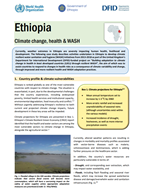
Ethiopia: Climate change, Health and WASH
Currently, weather extremes in Ethiopia are severely impacting human health, livelihood and development. The following case study describes activities...

The effectiveness of WASH interventions may be impacted by changing and more variable climate, extreme events and social issues. This technical report...
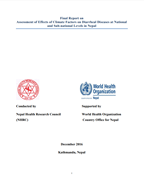
Final Report on Assessment of Effects of Climate Factors on Diarrheal Diseases at National and Sub-national...
This study examines the impact of climate-related factors on the incidence of diarrhoeal disease in children under five years of age in Nepal. Adaptions...
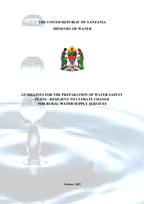
Guidelines for the Implementation of Water Safety Plans Resilient to Climate Change: Rural Water Supply...
These guidelines have been developed to support water supply authorities with water safety planning that adequately addresses the current and projected...

Guidelines for the Implementation of Water Safety Plans Resilient to Climate Change: Urban Water Supply...
These implementation guidelines have been developed to support urban water supply utilities to development and implement climate resilient WSPs. The guidelines...
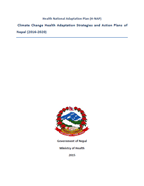
Health National Adaptation Plan (H-NAP) Climate Change Health Adaptation Strategies and Action Plans...
This document details the national climate adaption strategies to mitigate the projected adverse effects of climate change and variability on public health...

Identification of the Impact of Climate Variability and Environmental Hazards in Water Supply Systems:...
This baseline survey was conducted in four Pourashavas in Bangladesh (namely, Birampur, Cox’s Bazar, Naogaon and Ullahpara [Urban 2 group]) to provide...

Implementation of Climate Resilient Water Safety Plan in Water Supply System of Four Municipalities:...
This workshop report describes capacity building activities on climate resilient WSP development and implementation in four urban municipalities in Bangladesh...
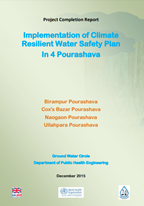
These technical reports describe the key outcomes from the development and implementation of climate resilient WSPs in 6 vulnerable water supply systems...
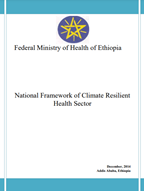
National Framework for Climate Resilient Health Sector
Recognizing the vulnerability of the Ethiopian health sector to climate projections, this document provides the basis for the development of climate resilient...
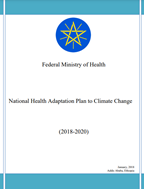
National Health Adaptation Plan to Climate Change 2018-2020
This document details the national climate adaptation strategies to mitigate the projected adverse effects of climate change and variability in the Ethiopian...
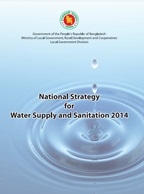
This publication presents strategic guidance to the water supply and sanitation sector and its stakeholders for achieving safe and sustainable water supply,...
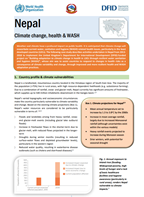
Nepal: Climate change, Health and WASH
Weather and climate have a profound impact on public health. It is anticipated that climate change will exacerbate current water, sanitation and hygiene...
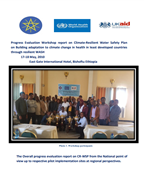
Progress Evaluation Workshop Report on Climate-Resilient Water Safety Plan on Building Adaptation to...
This report summarizes the progress made from implementation of CR-WSPs in 31 water supply systems under the DFID climate resilient WASH project from 2013...
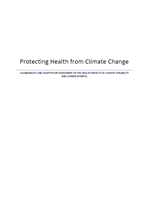
Protecting Health from Climate Change Vulnerability and Adaptation Assessment of the Health Impacts of...
This report describes the outcomes of a vulnerability and adaptation assessment of the health impacts of climate variability and change in Nepal. The study...
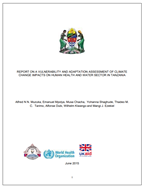
Report on Vulnerability and Adaptation Assessment of Climate Change Impacts on Human Health and Water...
This report describes the assessment of vulnerability and adaptation to climate change impacts on the health and water sectors in Tanzania. The outcomes...
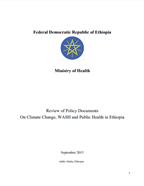
This report presents the findings from a review of national policies, strategies and programmes in relation to climate change, WASH and health. It examines...
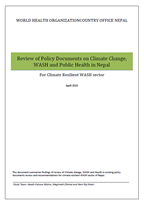
This document presents the outcomes from a review of existing national-level policies in relation to climate change, WASH and health. Based on the findings...
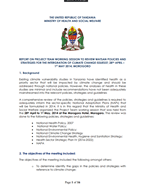
This document reviews the current policy instruments in Tanzania to support the development and implementation of climate resilient health and WASH policies....

Review of Relevant Policies, Strategies, Plans and Programmes Relating to Health and Climate Change in...
This report summarizes the progress made from implementation of CR-WSPs in 31 water supply systems under the DFID climate resilient WASH project from 2013...
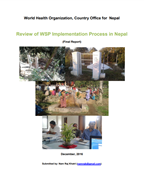
Review of Water Safety Plan Implementation Process in Nepal
This report assesses progress on climate resilient WSP implementation in Nepal to document lessons learned and share good practices among WSP practitioners...
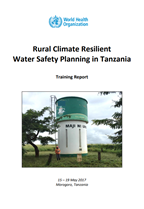
The purpose of this training event was to strengthen national capacity for the development of climate resilient WSPs in rural areas. In particular, the...
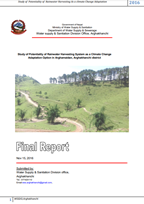
Study of Potentiality of Rainwater Harvesting System as a Climate Change Adaptation Option in Arghamaidan,...
This study report examines the feasibility of rainwater harvesting as a means to supplement community access to water for domestic and agricultural purposes...
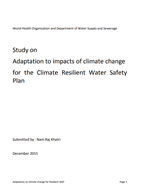
Study on Adaptation to Impacts of Climate Change for the Climate Resilient Water Safety Plan
This technical study examined appropriate water supply system improvements for adaptation to the impacts of climate variability and change, through the...
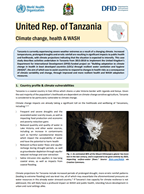
Tanzania: Climate change, Health and WASH
Tanzania is currently experiencing severe weather extremes as a result of a changing climate. Increased temperatures, prolonged droughts and erratic rainfall...
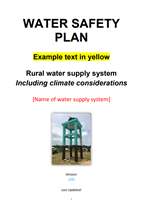
Template Climate Resilient Water Safety Plan for Rural System
This water safety plan (WSP) template was developed to support the integration of climate risks into the WSP approach for rural water supplies in the United...

The Effects of Climate Variability, Seasonal Variations and Environmental Events on Drinking Water Quality,...
This guidance document outlines standard operating procedures (SOPs) and tools to support data collection and training of field-level implementation teams....
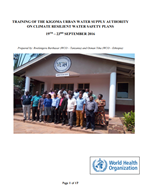
Training on the Kigoma Urban Water Supply Authority on Climate Resilient Water Safety Plans: Meeting...
To support the development of WSPs that consider climate impacts, a 5-day comprehensive training for urban water supplies was delivered. This pilot programme...
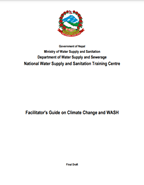
Training Package on Climate Change and WASH: Facilitator guide, Participant handbook
This comprehensive training package aims to strengthen the capacity of the District Engineers (within Department of Water Supply and Sanitation) to integrate...
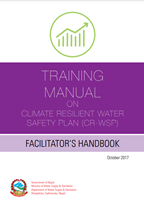
Training Package on Climate Resilient Water Safety Plan (CR-WSP): Facilitators handbook, Participants...
This training toolkit aims to support national roll-out of climate resilient WSPs by capacitating national trainers. The training materials are based on...
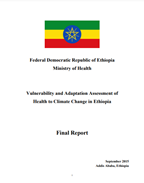
Vulnerability and Adaptation Assessment of Health to Climate Change in Ethiopia: Final Report
This report assess the key current and predicted vulnerabilities of the Ethiopian health sector to climate change. This assessment determined the vulnerability...

Vulnerability and Adaptation to Climate Change in Coastal and Drought Prone Areas of Bangladesh: Health...
This assessment examines the health impacts of climate variability and change on health in coastal and drought prone areas in three district of Bangladesh,...
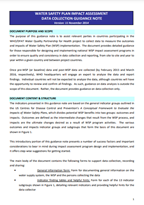
Water Safety Plan Impact Assessment: Data Collection and Guidance Note, Oromia Region
This note outlines an approach to measure the outcomes (i.e. the intermediate changes that result from the WSP process) and impacts (i.e. the ultimate...
Vision 2030 : the resilience of water supply and sanitation in the face of climate change: technical...
This report presents the findings of research into the projected impact of climate change on water and sanitation services by 2020 and by 2030. These time...
